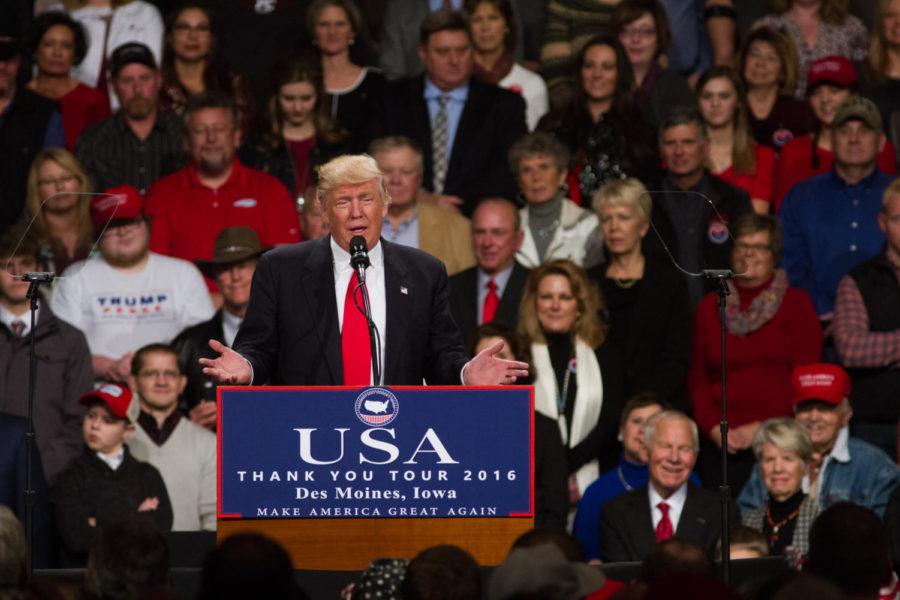Kelly: Whose side is Trump on?
President Elect Donald Trump speaks during a rally as part of his USA Thank You Tour, in Des Moines during the evening of Dec. 8. Trump spoke about the general election, how he would repeal Obamacare, bring jobs back to the US, and reform care for veterans.
April 20, 2017
Just a week after President Trump removed White House chief strategist Steve Bannon from the National Security Council, reports emerged that suggested Trump’s daughter Ivanka had swayed Trump to approve a missile strike on one of Syria’s air bases.
Two inferences could be reasonably made after analyzing this course of events: first, in the case of Bannon, Trump is evidently not comfortable with prominent members of his administration sucking up the oxygen in the room — media coverage — especially when media members promulgate the supposition that anyone within the administration has as much say-so as Trump himself regarding administrative decisions. Second, Trump does not appear to be guided by any static ideology.
Some of Trump’s ardent supporters would likely argue that this is evidence of his freewheeling pragmatism in action. But “political pragmatism” is generally a cover for the belief that politicians can do whatever they want.
So far, it has been impossible to align Trump’s actions with an ideological school of thought, or even an adherence to a fundamental set of principles. He has reversed his campaign positions on several major issues, including but not limited to: Chinese currency manipulation, the geopolitical threat posed by North Korea — as well as how to address it — and, most notably, whether the United States should take military action against the Assad regime in Syria.
Regarding Syria, Trump has transitioned from staunch support for the foreign non-interventionism of Steve Bannon to green lighting a missile strike in the course of a few weeks.
What changed? Yes, it’s possible that Trump has been blindsided by the realities of being the leader of the free world. But it is also troublesome that he can be swayed by whomever cheers for him the loudest, or even by whichever member of his administration is not stealing “his” limelight.
Trump voters who support an isolationist foreign policy, and are in favor of Trump’s “America First” mentality, are slowly coming to the realization that Trump may have pandered to them during the campaign, simply because he felt that they belonged to the subgroup of his supporters who gave him the most fervent and public support.
After all, Trump openly stated during the campaign, “You know, if it [campaign rally] gets a little boring, if I see people starting to sort of, maybe thinking about leaving … I just say, ‘We will build the wall!’ and they go nuts.”
Thus, it is increasingly apparent that Trump did not even subscribe to a guiding ideology while campaigning, a time span during which his stances on issues such as trade, illegal immigration and foreign intervention were, to be fair, mostly fixed.
In short, Trump’s flip-flops have followed a general pattern: One need only look to the politics of the person or group who has most recently praised Trump in public for holding a certain position to have a good idea of what policy Trump will come out in favor of next.
Now, one may be pleased with Trump’s “new” positions, as well as the actions and rhetoric stemming from them. But Republicans shouldn’t crown Trump a reborn Reaganite just yet.
It is clear that Trump will bend an ear to most everyone, regardless of his or her position on the political ideology spectrum, so long as he feels revered.
Ivanka and husband Jared Kushner, who reportedly have an increasing amount of influence within the White House, have spent most of their political lives on the mainstream left. Trump has threatened the GOP — members of which, he believes, were responsible for the failure of his health care bill — by suggesting that he will work with Congressional Democrats on a new health care bill. Until two weeks ago, he had been warm toward Russian President Vladimir Putin, who has spoken well of him.
Therein lies the problem. By all available evidence, Trump believes that, which improves his public image — by way of public praise — and makes him appear strong, benefits America, and, after receiving generally positive feedback for approving the Syria strike, the world.
It is true that Trump is not an ideologue; he reacts on an issue-by-issue basis, siding with pre-existing philosophies. But he who stands for nothing will fall for anything. When Trump is lauded for holding certain positions by adherents of various philosophies, he becomes extremely vulnerable to the influence of ideologues of all bends.
Will Trump’s allegiance ever swing toward his competent advisers, or will the direction of this presidency be dictated by public opinion polls? Right now, we just don’t know.
















